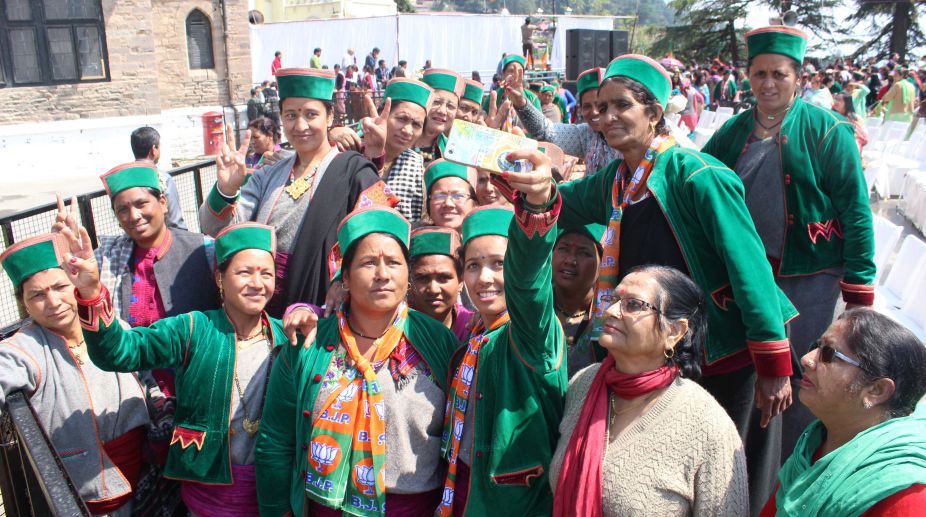Arecent report suggests that a high turnout of women could play a decisive role in the upcoming elections. As a result, political parties are offering various benefits to attract women as a critical segment of voters. The report also suggests that by 2047, women’s voter turnout could reach 55 per cent, while that of men could decline to 45 per cent. Parliament passed the Women’s Reservation Bill last September to empower women.
This bill ensures 33 per cent reservation for them in Parliament and state legislatures. Both the Congress and the BJP claimed credit for the bill’s passage. In 2008, the Congress could get it passed it in the Upper House but failed to do so in the Lok Sabha. PM Modi introduced this bill with pride, and it passed almost unanimously after 27 years last year. However, the bill’s implementation will be delayed for four years due to the delay in completing the delimitation process and the new census. It is noteworthy that B.R. Ambedkar, one of the key framers of the Indian Constitution once stated that “Political power is the key to all social progress.”
Advertisement
This statement holds today, as women will not receive justice unless they have a say in decisionmaking. Since gaining independence, India has had only one woman Prime Minister and 15 women Chief Ministers. However, the number of women contesting elections has increased sevenfold since the 1950s. Women’s representation in Lok Sabha has only risen from 5 to 15 per cent. One significant measure was that in 1993, onethird of Panchayat seats were reserved for women, which has now been expanded to 50 per cent in most states. Nearly a million women serve as sarpanches at the grassroots level.
These sarpanches could climb up the ladder with their experience. The upcoming General Elections will have over 96.88 crore eligible voters, with more than 47 crore being women. Out of the 2.63 crore new voters, 1.41 crore are female. More females have registered to vote in Kerala, Telangana, Tamil Nadu, Puducherry, Goa, Andhra Pradesh, Manipur, Meghalaya, Mizoram, and Nagaland. The quota Bill has not led to a significant increase in women’s political participation.
Political parties were expected to provide more representation for women in the recent assembly elections. Even though they supported the Women’s Reservation Bill, they allocated only 10-15 per cent of their tickets to women. The trend in the Lok Sabha polls is also dismal. BJP has given tickets to 67 women out of 421 candidates declared. But Chief Ministers like Mamata Banerjee, Nitish Kumar, and Arvind Kejriwal have understood the benefits of promoting women’s empowerment. Parties must develop more women leaders and include more women in their candidate lists to support the Women’s Reservation Bill better. However, they argue that women cannot win unless they belong to known political families. Many such leaders tend to appoint their family members to prominent political positions to maintain their dynasties.
It’s important to understand that not every woman will vote for a female candidate. Thus, assuming that all female candidates will receive votes from women may be ill-founded. The situation is similar globally. According to the Inter-Parliamentary Union, women comprise roughly 26 per cent of lawmakers worldwide. In Rwanda, on the other hand, women hold more than 60 per cent of seats. In 2008, Rwanda became the first country to have a female-majority parliament. Only 14 per cent of parliamentary seats in India are held by women. The last Lok Sabha had 78 women members, while the Rajya Sabha has 24.
Compared to 193 nations, India ranks 149th in terms of women’s representation in the lower house of Parliament. Less than 16 per cent of MLAs in states are women. Political parties should prioritize addressing essential issues instead of relying on showering incentives. They lure women voters with incentives but don’t field women candidates. To end discrimination, they should implement one-third of their tickets for women. Also, they should discourage the advantages given to dynasties.
Indian political parties are targeting women voters with various schemes and benefits. Congress in Karnataka offers women free bus travel and a Rs. 2,000 cash incentive. In Himachal Pradesh, women aged 18- 60 will receive Rs. 1,500 monthly. Delhi’s ‘Mukyamantri Mahila Samman Yojna’ will provide Rs. 1,000 monthly to women over 18 years. TMC in West Bengal has announced a remuneration hike. AAP and Congress offer incentives like Rs. 1,000 monthly payment and Rs. 1 lakh annual allowance before the Lok Sabha elections.
Political accountability towards women starts with achieving gender balance in decision-making positions, promoting the stronger presence and influence of women in political parties, and advancing gender equality issues in party policies and platforms. However, this is not enough on its own. We need governance reforms that are sensitive to gender issues. These reforms will enable elected officials to be more responsive.











